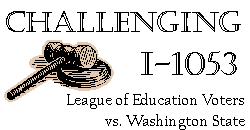
- Read the judge’s decision (PDF)
- Read the full decision (PDF)
A King County Superior Court judge ruled today that Initiative 1053 is unconstitutional.
“This lawsuit is another important piece in making sure our kids have all the resources they need to get an excellent education,” Chris Korsmo, Chief Executive Officer, said. “LEV was founded on the principle that our kids deserve fully funded schools.”
I-1053 requires a supermajority of the Legislature to raise taxes or close tax loopholes.
LEV is the lead plaintiff in the suit, along with the Washington Education Association, legislators, parents and taxpayers.
“This decision is a victory for the children of Washington state,” said Mary Lindquist, WEA president. “If it is upheld, this ruling will pave the way for the Legislature to fully fund K-12 public schools as mandated by the Supreme Court’s McCleary decision and the state Constitution. We hope it will be settled soon. Our kids can’t wait any longer.”
The Court held that the Washington Constitution establishes the exclusive rules for determining whether passage of a law requires a simple majority or super majority vote. Those rules cannot be altered by the legislature passing a law or by the people enacting an initiative. The Court noted that the Washington Constitution established super majority requirements for a number of types of laws, but not for tax increases.
Judge Bruce E. Heller wrote: “Plaintiff’s Motion for Summary Judgment is GRANTED. Plaintiffs present a justiciable controversy and have standing to bring this action. RCW 43.135.034(1)’s supermajority vote requirement violates the simple majority provision of Article II, 22 of the Washington Constitution, rendering that provision of the statute unconstitutional. Further RCW.43.135.034(2)(a)’s mandatory referendum requirement violates Article II, 1 and Article II, 1(b) of the Washington Constitution, rendering that provision of the statute unconstitutional.”
“This is a victory for the Constitution” said Paul Lawrence of the Pacifica Law Group, lead counsel for the plaintiffs. Lawrence explained: “The Constitution establishes the fundamental rules for how our governmental works. The framers considered what types of laws require a super majority vote for passage. Taxes were not identified as requiring a super majority vote. Fundamental changes in how the government operates have to be accomplished by constitutional amendment, not by passage of a law or initiative.”
Legislators who had joined as plaintiffs expressed similar hope that the case will allow the State to meet its constitutional obligation to fund public education. Jamie Pedersen, State Representative for the 43rd LD, said: “I am thrilled that the court reached the merits of this question and recognized that Tim Eyman’s initiatives requiring supermajority votes to raise revenue are unconstitutional and are hampering our ability to fund public schools. I feel hopeful that the Supreme Court – fresh off of its decision that the legislature is failing to fund education adequately – will give us back the tools to do so.“
Chris Reykdal State Representative for the 22nd LD echoed that that sentiment: “This is an historic decision for our state. Our treasured initiative process can clearly amend state law or advocate new laws, but it cannot amend the constitution. We all have to play by the same rules. We look forward to the State Supreme Court upholding this decision on appeal by the State. We have a court mandated obligation to fund basic education, and this decision restores the Legislature’s ability to do that with majority rule. In the end, our citizens, democracy, and our children are the biggest winners.”
Plaintiff State Senator David Frockt noted: “There are critical policy implications to this ruling. The elected representatives of the people should have all policy options available to them to change the downward spiral that we have been on in both K-12 and higher education investments in recent years. In my opinion, there has been an undeniable “chilling” effect on the development of options to address these issues. The full range of options are not seriously considered, much less debated, when it is perceived to be a futile effort in light of a minority’s ability to overrule the majority on the House or Senate floor. I have been appointed to serve on the education funding committee that has been established in response to the McCleary decision. If this ruling is upheld, as I hope it will be, I believe we will have a better shot at fulfilling our paramount duty to fully fund our educational system in the coming years.” Frockt further observed that the decision does not undermine the ability of the people to reign in government: “The people retain numerous checks on legislative power, through legislative elections every two and four years, as well as the power of referendum to overturn any policy changes the legislature may make. Nothing about this constitutional ruling changes those sovereign rights that the voters hold and will continue to hold.”
Lawrence expects the decision to be appealed directly to the Washington Supreme Court. He plans to ask for expedited review so that a decision can be rendered before the start of the 2013 legislative session.